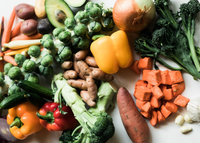SPUD is not your typical online grocery store
Everything that this Vancouver-based certified B Corporation does is focused on sustainability and doing things just a little bit differently.
Even if you’re not within their delivery area—which currently comprises certain regions of British Columbia and Alberta—you can take inspiration from their actions, and encourage grocery stores in your own area to follow SPUD’s eco-minded blueprint. Photo by Rodrigo dos Reis on Unsplash
Photo by Rodrigo dos Reis on Unsplash
Fighting food waste
According to the Government of Canada, about 20 percent of the food produced in the country each year gets wasted. The situation is even bleaker in the United States, with the U.S. Department of Agriculture estimating that 30 to 40 percent of the food supply is wasted annually.
The reasons for this staggering volume of waste are vast, ranging from mishandling food during shipping to consumer confusion regarding best-before dates. One common problem that SPUD is fighting is the culling of “ugly” produce. Many farms get rid of imperfect-looking but perfectly nutritious fruits and vegetables because most grocery stores refuse to sell them. And stores do a further cull of the produce that gets bumped and bruised when handled by consumers. Because SPUD is online only, it doesn’t need in-store displays filled to overflowing with pristine produce for consumers to squeeze (and drop).
According to Helena McShane, communications manager at SPUD, the company works hard to come up with creative uses for less aesthetically pleasing food, to encourage consumers to change their thinking. “I think a lot of people are on board. They just need a little bit of help to make those imperfect apples into apple pie or applesauce,” she says. As inspiration, the SPUD blog includes posts such as recipes for rescued apple pie and rescued banana smoothie. Plus, the company offers discounts on imperfect produce.
Another way that SPUD reduces food waste: perishables, such as breads, pies, cookies, soups and ready-to-eat meals, must be ordered a few days in advance so that they can be made to order. Nothing extra means nothing gets wasted. SPUD also donates surplus food to organizations that help feed the hungry, such as food banks and community kitchens. After all of these initiatives, any food scraps that remain are turned into compost, which is used by SPUD’s farmer partners.
Consumers may think that their role regarding this issue is small, but collectively we can encourage the big grocery store chains to reduce food waste in a meaningful way. McShane says the key is for shoppers “to put pressure on the bigger organizations that can actually make the change happen.” Photo by Harshal S. Hirve on Unsplash
Photo by Harshal S. Hirve on Unsplash
Embracing technology
SPUD uses FoodX Technologies to detect patterns based on what customers are putting in their carts up to two weeks before their scheduled delivery date. This clever software helps the company accurately predict supply and demand, which minimizes food waste by preventing overbuying. More than 60 percent of SPUD’s stock turns over every 48 hours.
Other software is used to plan out the most efficient delivery routes for SPUD drivers to follow each day—in effect, carpooling groceries. This reduces the vehicles’ greenhouse gas emissions by half compared to customers driving themselves to traditional grocery stores. And, in some areas, SPUD deliveries are done by electric trike. Photo by Rodrigo dos Reis on Unsplash
Photo by Rodrigo dos Reis on Unsplash
Focusing on local
Strong relationships with local farmers and producers mean that the majority of the food SPUD sells doesn’t have to go far to reach the warehouse. Each item listed on the website includes the distance that the item had to travel. Not every single product can be sourced locally, but those that come from farther away have a focus on being sustainable, organic and fair trade.
Returning and reusing
Deliveries are shipped in reusable bins, and food is kept chilled using insulated freezer jackets and ice packs. Drivers deliver full bins and pick up the empty bins, freezer jackets and ice packs and return them to SPUD to be cleaned and used again.
SPUD has also launched a Takeback Program that allows customers to return flexible plastic pouches from Be Fresh and Nature’s Path products, to be recycled into items such as plastic outdoor furniture. In the Lower Mainland, empty glass jars from Jarr, Avalon and Earnest Ice Cream can also be returned to be cleaned and reused.
Banning harmful ingredients
The focus at SPUD is on real food that is healthy, local and GMO-free. The company has compiled a list of food additives that they deem unhealthy for people and the planet, which they consult when determining whether to stock a new product. A small sample from their extensive list of banned ingredients includes: artificial colours and flavours, aspartame, high-fructose corn syrup, hydrogenated oil or fat, irradiated foods, Olestra, plant sterols, saccharin and sucralose.
 Photo by Nathan Dumlao on UnsplashSharing information
Photo by Nathan Dumlao on UnsplashSharing information
Workshops, blog posts and social media are just a few of the ways that SPUD spreads their message about reducing food waste. And they encourage other grocery stores to follow their eco-friendly path.
“We’re not in competition for sustainability,” says McShane. “We all need to work together on this. The more grocery stores that get on board, the more we can all work together and save the planet and save the people.”

